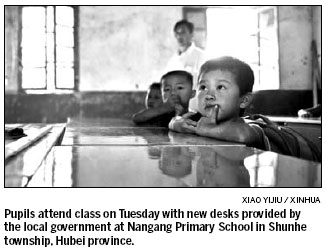Students get new desks after media attention
Updated: 2012-09-06 07:53
By Luo Wangshu (China Daily)
|
||||||||

Zhong Fuhai never thought the power of the mass media could equip his students with school desks and chairs, leaving the era of "bring your own desk" behind.
Although suffering a sore throat from endless interviews with reporters in recent days, the 48-year-old teacher at Nangang Primary School in Shunhe township, Hubei province, was cheered by the arrival of new school desks and chairs.
"I've been working here for more than 30 years, and I was used to the lack of desks and chairs at the school. I never thought a news story could help us," Zhong said.
A recent story by the Changjiang Times, a Hubei newspaper, reported that more than 3,000 primary school students in Shunhe had to carry their own desks and chairs to the school due to a shortage of supplies.
The report caught the attention of the public and triggered online discussion.
Local authorities reacted quickly by providing subsidies and initiating donations to those schools.
According to a statement from the publicity department of Macheng, which has jurisdiction over Shunhe, local authorities promised on Wednesday that all students from local primary and middle schools will have desks and chairs provided for them this year.
At Nangang Primary School, 13 sets of desks and chairs were delivered by local education authorities on Tuesday. The school has 10 students in all.
"The kids are jubilant about the arrival of new desks and chairs, so are their parents," said Zhong Fuhai, the teacher.
"They don't need to bring their differently shaped desks to school any more."
The school furniture problem has also been resolved at Changchong Primary School. Xiang Mingxiu, the only teacher at the school, said 14 sets of desks and chairs, were delivered, enough for all the students.
Yao Yao, a Fulbright research fellow at the John F. Kennedy School of Government at Harvard University who has expertise in communications, said the case is a successful example of cooperation between mass media and a local publicity office.
Since the regulation requiring government information be open to the public was implemented in 2008, collaboration between mass media and local publicity departments to solve tough problems has been encouraged, Yao said.
"China is a big country, which may cause slowdowns in policy being implemented at a local level government. Mass media discovered this problem and made it public, which helped local authorities become aware of the problem and solve it quickly," Yao added.
He applauded the collaboration in this instance.
luowangshu@chinadaily.com.cn
(China Daily 09/06/2012 page4)

 Relief reaches isolated village
Relief reaches isolated village
 Rainfall poses new threats to quake-hit region
Rainfall poses new threats to quake-hit region
 Funerals begin for Boston bombing victims
Funerals begin for Boston bombing victims
 Quake takeaway from China's Air Force
Quake takeaway from China's Air Force
 Obama celebrates young inventors at science fair
Obama celebrates young inventors at science fair
 Earth Day marked around the world
Earth Day marked around the world
 Volunteer team helping students find sense of normalcy
Volunteer team helping students find sense of normalcy
 Ethnic groups quick to join rescue efforts
Ethnic groups quick to join rescue efforts
Most Viewed
Editor's Picks

|

|

|

|

|

|
Today's Top News
Health new priority for quake zone
Xi meets US top military officer
Japan's boats driven out of Diaoyu
China mulls online shopping legislation
Bird flu death toll rises to 22
Putin appoints new ambassador to China
Japanese ships blocked from Diaoyu Islands
Inspired by Guan, more Chinese pick up golf
US Weekly

|

|






